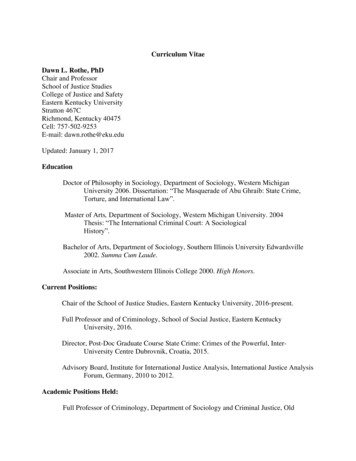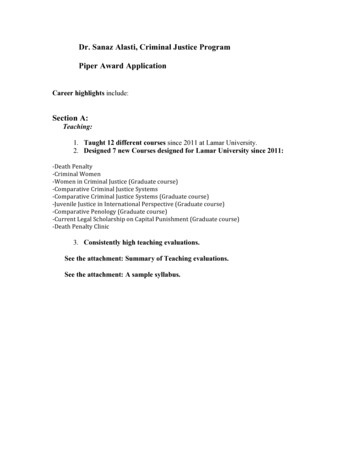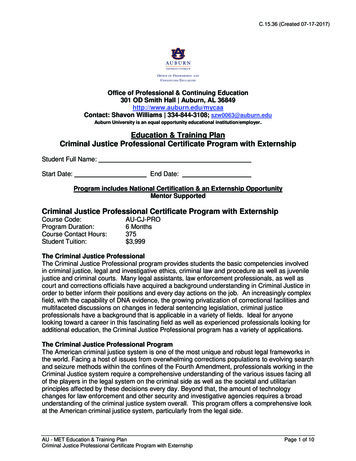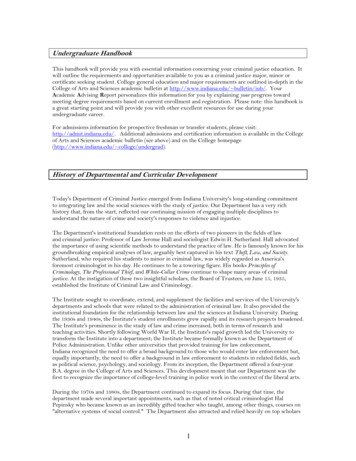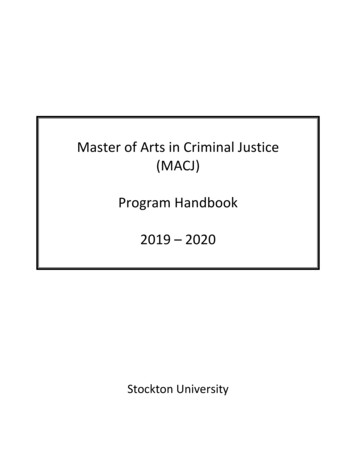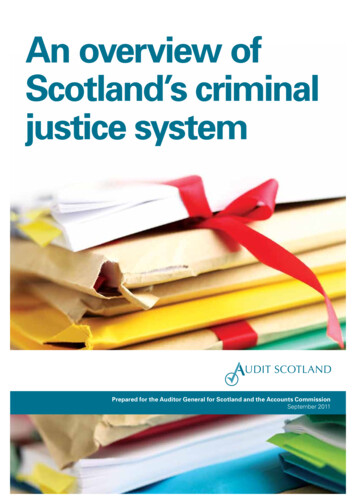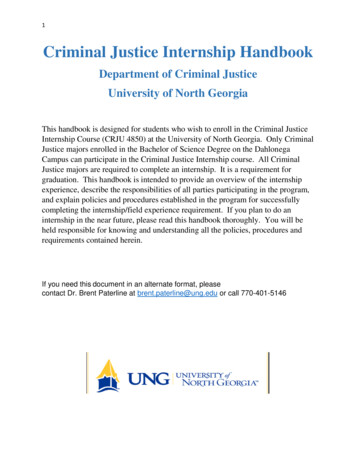
Transcription
1Criminal Justice Internship HandbookDepartment of Criminal JusticeUniversity of North GeorgiaThis handbook is designed for students who wish to enroll in the Criminal JusticeInternship Course (CRJU 4850) at the University of North Georgia. Only CriminalJustice majors enrolled in the Bachelor of Science Degree on the DahlonegaCampus can participate in the Criminal Justice Internship course. All CriminalJustice majors are required to complete an internship. It is a requirement forgraduation. This handbook is intended to provide an overview of the internshipexperience, describe the responsibilities of all parties participating in the program,and explain policies and procedures established in the program for successfullycompleting the internship/field experience requirement. If you plan to do aninternship in the near future, please read this handbook thoroughly. You will beheld responsible for knowing and understanding all the policies, procedures andrequirements contained herein.If you need this document in an alternate format, pleasecontact Dr. Brent Paterline at brent.paterline@ung.edu or call 770-401-5146
2Table of ContentsThe Criminal Justice Internship Webpage . 2Who’s Who in the Criminal Justice Internship Program . 3The Benefits of a Criminal Justice Internship. 4Eligibility Requirements .Error! Bookmark not defined.Credit for Previous Employment . 5Denial of a Student from the Internship Program . 6Termination of a StudenT Internship .Error! Bookmark not defined.Dangerous Situations . 7The Participation in Training During Your Internship .Error! Bookmark not defined.Changing Sites During Your Internship .Error! Bookmark not defined.Internship Course Requirements .Error! Bookmark not defined.Work Hours.Error! Bookmark not defined.Writing Assignments .Error! Bookmark not defined.The Supervisor Evlaution .Error! Bookmark not defined.STEPS IN SETTING-UP YOUR INERNSHIP1. Read the Criminal Justice Handbook .Error! Bookmark not defined.2. Select an Internship Agency .Error! Bookmark not defined.3. Contact Host Agency and Complete All Application Requirements. Error! Bookmark notdefined.4. Turn in a Signed Letter of Agreement to the Internship Coordinator. Error! Bookmark notdefined.5. Register for the Course .Error! Bookmark not defined.6. Setup a Schedule with your Site Supervisor .Error! Bookmark not defined.7. Start your Intenrship and Keep Track of Your Hours.Error! Bookmark not defined.Intern Conduct . 16Attendance .Error! Bookmark not defined.Professional Behavior .Error! Bookmark not defined.Grooming and Dress .Error! Bookmark not defined.Confidentiality .Error! Bookmark not defined.Problems at the Internship Site .Error! Bookmark not defined.Liability Issues .Error! Bookmark not defined.Responsibilities of the Internship Agency .19Appendix A: Internship Agency Websites 20
3THE CRIMINAL JUSTICE INTERNSHIP WEBPAGEThe Department of Criminal Justice and has created an Internship information p-information.php On this website students can viewinformation on the Criminal Justice Internship program, including a copy of this handbook, thesyllabus for the Internship course, and all of the required forms related to the Internship.Students are strongly encouraged to utilize the information and forms are this website inpreparation for and during their Criminal Justice Internship.WHO’S WHO IN THE CRIMINAL JUSTICE INTERNSHIP PROGRAMThe Criminal Justice Internship CoordinatorThis the faculty member who manages the Criminal Justice Internship Program. The majorresponsibilities of the coordinator include providing information on the Internship Program,assisting student in obtaining an internship that matches their career goals, acting as a liaisonbetween the student and their internship agency, recruiting new internship agencies andmaintaining ties with current site placements, ensuring the student completes all requiredpaperwork necessary for them to begin their internship, grading all writing assignments for theinternship course, distributing intern evaluations to site supervisors, and submitting final gradesfor the internship course.Currently, the Criminal Justice Internship coordinator is Dr. Brent Paterline. Dr. Paterline hasover 20 years of experience in supervising interns and running the internship program. He hasnumerous contacts with Criminal Justice agencies. He is dedicated to helping student have asuccessful internship experience. Please feel free to call or email him anytime. Dr. Paterline’scontact information is below:Dr. Brent A PaterlineCriminal Justice Internship CoordinatorEmail: brent.paterline@ung.eduCell Phone: 770-401-5146.Host Agency (Placement Site)The host agency or placement site is the agency where a student interns. Internship placementsare arranged by the internship coordinator in consultation with the student and the prospectivesite, however, students may locate their own placements subject to approval of the InternshipCoordinator. The most often placement sites include law enforcement agencies at the federal,state, county and local levels of government; courts and related judicial agencies; juvenile Justiceand related service agencies; and correctional programs. New placements are continually beingdeveloped in accordance with students' interests.
4The Site Contact PersonThis is the individual who serves as the point person for internship applications at that site. Anagency may receive internship requests from many students, not only from UNG, but also fromstudents at other area colleges. Thus, it is more efficient for each site to have one designatedcontact person. At the Sheriff’s Office and Police Departments, the contact person is usually atraining officer. The internship coordinator maintains a list of all site contact person wherestudent have interned over the last 10 years. This list is not share with the public, only CriminalJustice majors at UNG. To get this list, please email the internship coordinator, who will emailthis list one to two days after you submit your request.The Site Supervisor:This is the professional at the internship site who is responsible for the orientation, training,education, and close day-to-day supervision of the intern. This is the individual who will beresponsible for completing the student’s evaluation. Oftentimes, the site contact person and thesite supervisor are the same person, but not always. In some cases, an intern will work with anumber of different professionals at their internship site. If your supervisor changes during yourinternship, please email the internship coordinator. The internship coordinator must keep abreastof who should receive your final evaluationBENEFITS OF A CRIMINAL JUSTICE INTERNSHIPThe major in Criminal Justice is designed to prepare students for entrance into professionalpositions in the field of Criminal Justice. The Criminal Justice Internship is an important part ofthe undergraduate program in Criminal Justice at the University of North Georgia and representsan integral part of student’s education by providing students with an opportunity to integrateacademic learning with hands-on experiences obtained in a Criminal Justice setting. Theinternship is an academic learning experience in which students are expected to successfullycomplete multiple written assignments that analyze concepts and issues from previous coursework and relate them to agency experiences. This provides students with the ability to applyknowledge acquired in the classroom with practical experience from their internship.The internship allows the student to gain firsthand knowledge about what it is like to work in aspecific Criminal Justice agency. Internships have the potential to increase a student’s careerpreparedness and actual employability. A number of studies have found that students whocomplete internships feel more prepared for their careers and obtain a more accurateunderstanding of their career. Participant observation allows interns to learn about the duties,expectations and challenges associated with a particular career, improving their ability to assesswhether the profession is right for them. It also gives the internship agency the ability to assessthe student for potential job openings. Another advantage offered by internships includesproviding students with networking opportunities. Internships often place students with positions
5to interact and develop professional relationships with experienced professionals who can serveas mentors, role-models, teachers and references.A successful internship is a great resume builder, especially for traditional students whose workexperiences may be somewhat limited. An internship is a great way to begin networking,students will meet successful Criminal Justice professionals as they go about their everydayroutines. Not only will you gain from personal interactions and interviews with these people,many times they will agree to become a reference for you, this is not an opportunity easily madein a typical university setting. Insiders may also have tips about upcoming jobs. While aninternship is certainly not a guarantee of a later placement, many students “got their foot in thedoor” by completing successful internships.ELIGIBILITY/PREREQUISITESThere are five requirements you must meet before you are eligible to enroll in a Criminal JusticeInternships.1. Only Criminal Justice majors enrolled in the Bachelor of Science Degree on UNG’sDahlonega Campus can participate in the Criminal Justice Internship course. Studentsenrolled in the Associates Degree on the Gainesville Campus cannot participate in theCriminal Justice Internship.2. You must have completed all of area F in your Criminal Justice plan of study.3. You must have taken and completed CRJU 3601 (Research Methods)4. You must have completed a minimum of 18 hours of Criminal Justice classes5. Students must have a GPA of at least 2.0 overall and in their major.The internship course can be taken in the Fall, Spring, or Summer semesters. It is recommendedthat students complete their internship during their last semester. The reason for therecommendation is that many students are offered a job immediately following the completion oftheir internship. However, if the intern is, for example, a junior, the agency will not be able tohold the position for a year until the student graduates.Students taking the internship during the fall or spring semester can register for two additionalcourses if they wish. It would be best for the student if these courses were online. Studentsregistered for the internship course during the summer semester may not take any additionalcourses during the summer semester. Exceptions will depend on the students’ overall GPA,graduation plans, and the discretion of the Internship Coordinator.CREDIT FOR PREVIOUS EMPLOYEMENT AND TRAINING EXPERIENCESThe Department of Criminal Justice at the University of North Georgia does not giveinternship credit for previous occupational or training experience. The objective of theinternship program is to allow students to utilize the knowledge from their course work andapply it to real life situations. As an intern, the student is a field researcher, in which he or shetakes field notes about their observations and experiences, assesses his or her internship agency,
6and writes research papers relating to the operation of the internship agency. Most of thisresearch cannot be done retroactively.DENIAL OF A STUDENT FROM THE INTERNSHIP PROGRAMThe Department of Criminal Justice believes that all students who apply for an internshipmust be personally and psychologically equipped, as well as academically prepared, for theexperience. Interns are representatives of the University of North Georgia, and therefore, musthave a strong personal character consisting of maturity, integrity and high ethical standards. Astudent may be denied entry to an internship by the department, if the student, based on theprofessional judgment of the Criminal Justice faculty, has a questionable character or hasexhibited behavior that indicates erratic, unpredictable or unsuitable conduct, including but notlimited to:1. Known Honor Code or Academic Integrity Violations2. Frequent Tardiness3. Rudeness4. Erratic Behavior5. Known Alcohol and Drug Problems6. Known Criminal History7. Psychological Instability8. Poor Academic Performance9. Deceitful Behavior and/or LyingIf students have a criminal record either before they declare their major, or acquire a criminalrecord after declaring their major, they may be prohibited from participating in an internship.This policy is based on the premise that Criminal Justice faculty should be a part of theevaluation of a student's ability to function adequately and safely in a work setting and thatfaculty have a right and responsibility to make such judgments prior to placing a student in aninternship.A student who is denied an internship may be allowed to fulfill his or her graduationrequirements by taking an equivalent number of academic courses. The student must take 12hours of 4000 level courses (four 4000 level courses) to replace the Internship requirement.TERMINATION OF A STUDENT INTERNSHIPThe internship coordinator has the authority to withdraw a student from an internship if astudent's performance constitutes a detriment to other personnel at the internship site or if thestudent behaves in an unprofessional manner during his or her internship. Information anddocumentation related to the withdrawal may be based on the direct knowledge of the internshipcoordinator or from information forwarded to the coordinator by the internship agency. If astudent is fired or dismissed from their internship because of unprofessional behavior or poorperformance, the student will be denied any future opportunities to take part in an internship.The opportunity to complete a formal, for-credit Criminal Justice Internship is considered aprivilege, not an entitlement. The internship represents a very important and public partnership
7between the University of North Georgia and various Criminal Justice agencies. To guaranteeyour success as an intern, the Department of Criminal Justice will make every effort to ensurethat the site is a positive and supportive environment. Students are expected to adhere to the rulesand regulations of the internship site (agency). It is the primary responsibility of the intern torequest a copy of these rules and to be cognizant of said rules. Failure to adhere to any of the setexpectations, or poor performance over a substantial period of time, may result in the removal ofa student from his/her internship site.The Department recognizes that the internship site (host agency) has the ultimate right toterminate a student’s internship for such reasons as: Not following the rules and regulations of the host agency.Releasing or discussing confidential informationThe continued participation of the intern could be harmful to agency clientele, theintern, and/or the participating agency.Repeated unexcused absences or tardinessRepeated changes in scheduled hours without approval by internship supervisorAllegations of sexual harassment, bullying, intimidation or verbal harassment towardsagency clientele, visitors, employees or other agency interns.The failure to communicate with the internship coordinatorA change in the intern's criminal background status anytime during the internshipprocess (criminal charges have been filed or are pending)Any other on-site behaviors deemed inappropriate according to host agency standardsIf a student is removed from their internship site, the student will automatically receive a gradeof F for the course and will not be allowed to continue his or her internship with another agency.The student will also not be permitted to participate in any future internships. A student who isremoved from their internship may be allowed to fulfill his or her graduation requirements bytaking an equivalent number of academic courses. The student must take 12 hours of 4000 levelcourses (four 4000 level courses) to replace the internship requirement.A student may appeal an internship denial or withdrawal by requesting that an appeals committeehear his or her case. The appeals committee will consist of two Criminal Justice faculty memberswho are not intern coordinators and one faculty from another academic department. The studentmay appeal his or her case a second time by presenting the case to the Chair of the Departmentof Criminal Justice. The student may appeal his or her case a third time by presenting the case tothe Dean of the College.DANGEROUS SITUATIONSWhile Criminal Justice work is sometimes risky, interns must not allow themselves to be placedin any dangerous situations; i.e. carrying a gun, making arrests, etc. Interns should also never beplaced in a position where they work “undercover” buying drugs or alcohol. That is neither yourjob nor your responsibility. It might seem exciting at the time but more often than not, results introuble. If a supervisor orders you into a dangerous situation, respectfully and firmly decline andcontact the internship coordinator. This policy does not pertain to student who are full-time
8employees at their host agency or students in the UNG Public Safety Academy who areparticipating in an FTO program.THE PARTICIPATING IN TRAINING DURING YOU INTERNSHIPStudents can elect to participate in any training at their agency under the direction of theirsupervisors. Students, for example, at a law enforcement agency may participate in SWATtraining, firearms training, bicycle training, field sobriety training, or K9 training. Such trainingis considered elective and UNG is not liable for any injuries that may occur while an internparticipates in such training activities. The host agency is responsible for the safety of theinterns. If an intern feels that a training session may be “too risky” she or he has the right torefuse to participate in the training.CHANING INTERNSHIP SITES (AGENCIES) BECAUSE OF BAD EXPERIENCESThere are times when a student experiences an internship in which they are not having a goodexperience. The intern, for example, may be working for a law enforcement agency that neverallows them to participate in ride-a-longs or the intern may be interning at a district attorney’soffice in which they are doing nothing but secretarial duties, such as answering the phone, butare never allowed to observe court case. If there is a problem with your internship the internshould contact the internship coordinator immediately. Please do not wait until six weeks intoyour internship to tell the internship coordinator that you are having a terrible internship. Theinternship coordinator will be able to place you with another host agency.INTERNSHIP COURSE DESCRIPTION (CRJU 4850)This course provides students with the opportunity to observe the Criminal Justice system inoperation by providing a structured and extended off-campus internship experience at a CriminalJustice setting related to a student’s career interest. During the internship, students are expectedto integrate classroom knowledge with real-life work experience, develop practical career-relatedskills and training, explore a career before graduation, and obtain work experience andprofessional contacts for future job seeking. To complete this course, students must work a totalof 320 hours at a Criminal Justice related agency and complete three learning modules on D2L.Internship placements are subject to the approval of the internship coordinator.INTERNHSIP COURSE OBJECTIVES1. Gain an understanding of qualitative research by conducting field research as aparticipant- observer with an agency in the Criminal Justice system.2. Integrate classroom knowledge with real-life work experience through a combination ofpractical experience and scholarly research.3. Evaluate an agency within the Criminal Justice system and understand how the agencyfunctions within the Criminal Justice system.
94. Learn career-related skills and training by effectively working as an intern at a CriminalJustice agency.INTERNSHIP COURSE REQUIREMENTSWork HoursStudents enrolled in the internship course (CRJU 4850) are required to work a total of 320 hoursat their internship site during the semester in which they are enrolled in the course. Students canwork full time (40 hours a week for eight weeks) or part-time for 15 weeks (20-22 hours aweek). Keep in mind that the summer semester is only eight weeks long. The spring and fallsemester are 15 weeks long. Students doing their internship during the summer may start theirinternship early (after May 14) with the approval of the internship coordinator.Students working full-time or part-time at a Criminal Justice agency may use their work hours asan internship. However, students cannot count past work hours (hours worked before enrolled inthe course) toward their internship course. Students who are undergoing field training, such asFTO with police agency, can count their field training toward their internship course as long asthey are enrolled in the course. Students cannot count any hours at a police academy or militarytraining as internship hours. Some internship agencies require training that is to be completedbefore a student begins his or her internship. In this case, training hours will count toward the320 hours required for the course. Please remember: Any internship hours completed while notenrolled in an internship course are completed as a community member and not in the capacity ofa Criminal Justice Intern, so they will not count towards students’ required hours.Students can count lunch hours or breaks toward the 320 hours. Student cannot count drivetimes to and from their agency. However, if “on call” or “on the clock,” an intern can counthours driving to a training facility, a crime scene, or other work-related site.As a student at UNG, you are entitled to observe all the holidays designated on the CollegeAcademic Calendar, as well as any holidays observed by your internship agency. If regularlyscheduled internship hours occur on a holiday (e.g., Martin Luther King, Jr. Day), you areexpected to make up those hours on another day. You are encouraged to arrange make-uparrangements as soon as possible. Holidays that are not observed by the internship agency (e.g.,UNG's spring break or fall break) should be discussed prior to the start of your internship. It isthe responsibility of the student-intern to communicate the college’s holiday schedule to theirsite supervisor and make plans accordingly.If an intern is unable to complete internship hours due to illness or the illness of a dependentfamily member, s/he is responsible for contacting the site supervisor before the scheduledinternship work time, via both email and telephone. Missed internships days must be made upwithin two weeks, on a time/day that has been agreed upon by the intern and the site supervisor.If absences exceed two (2) internship days, the student must get a note from a medical
10professional and submit it to both the site supervisor and the internship coordinator. Theinternship coordinator must also be notified via email.Interns will keep track of their hours worked by filling three “Internship hours worked forms.”These forms can be found on D2L or on the Criminal Justice homepage under internship forms.As an intern, you should submit three of these forms for each of the three modules of yourInternship (1) 0-100 hours worked, (2) 100-200 hours worked, and (3) 200-320 hours worked. Atthe end of each phase (module) of your internship you should turn in an “hours worked form.”These forms must be signed by your supervisor. Do not wait until the end of the semester tofill out and sent out these forms, your grade will be deducted for reports that are late. You will bededucted 50 points off your final grade for each form that is turned in past the due date. Duedates will be posted on the course schedule in D2L.Writing AssignmentsEvery 100 hours, students will turn in two writing assignments: (1) a research paper and (2) ajournal entry. All papers will be turned in on D2L. Research papers will pertain to eachstudent’s internship experience. The first research paper, for example, will describe the structureof a student’s host agency, the history of student’s host agency, and a description of thejurisdiction in which the agency in located. The second paper is a research paper in whichstudent will examine at least four studies on a topic related to their internship (e.g. drug courts,use of body cameras, DUI enforcement). The third paper will assess the host agency and how itfunctions in the Criminal Justice system.Student journals should describe the duties an intern performed over the last 100 hoursand analyze an intern’s experiences and observations. For each journal assignment students willbe required to answer several discussion questions about their internship experience. In additionto answering the discussion questions, students should write about anything they observed or anyduties they performed during their internship. A student’s journal should not be a list of whatthey did each day, rather, it should be reflective in nature. For example, an intern might writeabout an interesting case they worked on and their thoughts and feelings about the case. Yourjournal entries should be as detailed as possible so as to illustrate you are thinking about yourongoing experience.Your journal is confidential, and the internship coordinator will not share any of your journalswith anyone unless ordered by a court. In over 40 years, an internship coordinator at UNG hasnever had to turn over a student’s confidential journal to a court or an internship agency. Someinternship agencies may have rules about confidentiality and students discussing open criminalcases. However, you can still write in your journal without disclosing personal names andidentifiers of clients you serve.The Supervisor’s EvaluationApproximately two weeks from the end of the semester, the internship coordinator will emailyour supervisor an evaluation form. The purpose of this evaluation is to assess the student’sacademic and professional preparedness and growth in a Criminal Justice setting. Informationprovided by the agency will be used to help determine the student’s grade for the course. It is
11important to remember that 40 percent of your grade is based upon your supervisor’s evaluation.These evaluations will be sent out by me via email towards the end of your internship. It istherefore important to make your supervisor happy and maintain a good relationship with yoursupervisor. I must base your grade on the evaluation I receive from your supervisor. If you andyour supervisor do not get along, this may affect your grade.The internship coordinator will make every effort to contact a supervisor in order to obtain aninternship evaluation form. The internship coordinator may ask the student intern in help withobtaining a form from their supervisors. If the internship coordinator and intern were bothunable to obtain an internship evaluation form from the supervisor, the intern will automaticallyreceive 350 points out of 400 points for their supervisor evaluation.COURSE GRADEA letter grade will be earned by the student in accordance with his/her performance in the course.The final grade will be determined by the Criminal Justice Internship Professor.To complete this course, students must work a total of 320 hours at a Criminal Justice relatedagency and complete three learning modules on D2L. Each learning module consists of twoassignments (1) a research paper and (2) a field journal entry. For each module, students are alsorequired to turn in “hours worked” forms that require their supervisor’s signature.Each learning module for this course is comprised of a possible 200 pointsField Journal 50 PointsHours Form 50 PointsModule Paper 100 Points200 Points per ModuleThere are 3 online modules for a possible of 600 points.Written AssignmentsSupervisor Evaluation600 Points400 Points1000 PointsSTEPS IN SETTING-UP YOUR INTERNSHIPBelow are the steps involved in setting up an internship.Step 1: Read the Criminal Justice Internship Ha
Internship Course (CRJU 4850) at the University of North Georgia. Only Criminal Justice majors enrolled in the Bachelor of Science Degree on the Dahlonega Campus can participate in the Criminal Justice Internship course. All Criminal Justice majors are required to complete an internship. It is a requirement for graduation.


